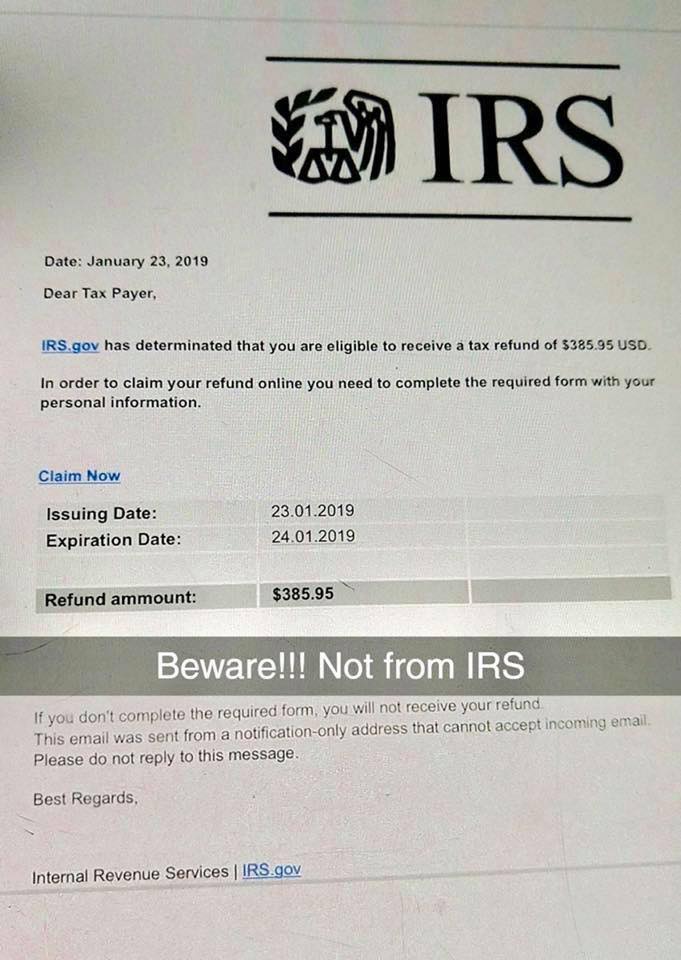It’s tax season and for many it is not a pleasant time, as taxes are due. Scammers are also busy conning tax payers into paying them by pretending to be Internal Revenue Service (IRS) representatives. IRS scams occur year-round and are consistently one of the top scams. IRS imposters contact individuals, and even target businesses, posing as the IRS and demanding immediate payment. These scammers use threats, intimidation, and fear tactics to fool victims into sending them money. Then they vanish, leaving the victim to handle the aftermath of the scam. Their tactics continually become trickier each year, but some of the telltale signs of the scam are easy to spot. Here’s some information to help you avoid falling into a taxing situation with these IRS scammers.
Oftentimes, these con artists will contact victims by phone, claiming to be an auditor, an officer from the IRS, an IRS employee, or even the federal government. They have the capability to fool caller ID to make it appear as if the call is coming from the IRS directly or another government agency. The person may use a badge number to make the ruse even more believable. They’ll claim that you owe a tax debt or other fees and to avoid arrest, imprisonment, lawsuits, or deportation, immediate payment is necessary. The method of payment required may be to wire money, provide bank or credit card information over the phone, or even demand that the individual purchase gift cards or prepaid debit cards to send an instant payment. If any of the above occurs, hang up. They are not the IRS.
The IRS will never:
- Call and demand immediate payment by prepaid debit card, gift card, or wire transfer.
- Threaten to have law enforcement arrest you or deport you over a tax debt.
- Demand payment without allowing you an opportunity to question or appeal the amount owed.
- Send an email, text, or private message through social media to obtain personal financial information such as your bank account information, PINs, or passwords.
If you are contacted by anyone claiming you owe a tax debt, follow up and investigate on your own. Contact the IRS at their official number (800) 829-1040 to discuss whether you owe a debt or not. You should also contact the Treasury Inspector General for Tax Administration at (800) 366-4484 to report IRS scams. If you wired money to an IRS scam through Western Union, you may be able to file a claim.
According to the Treasury Inspector, the top five States with the most losses to IRS imposter scams are: California (more than $10 million), New York (more than $4 million), Texas (more than $4 million), Illinois (more than $3 million) and Florida (more than $2 million).
Tax payers should also be aware of a circulating tax refund scam. Individuals have reported receiving emails allegedly from the IRS claiming the recipient is eligible for a tax refund. To receive the refund, the recipient needs to fill out a form the scammers attach to the email and return it. The information requested includes personal and financial information. While the email has IRS.gov all over it, it is a scam.

Victims of IRS scams can play a big part in stopping the scams from affecting others by speaking out. Don’t remain silent if a scammer has tried to con you. File a complaint with Business Consumer Alliance so others are aware of what to look for. Check out some of the stories shared with BCA from individuals that have encountered these scams. Follow BCA on Facebook and check our website www.checkbca.org for information on scams, consumer and business tips, and much more.
About Business Consumer Alliance
Business Consumer Alliance (BCA) is a non-profit company that started in 1928. The broad purpose of BCA is to promote business self-regulation. BCA's mission is achieved by assisting consumers in resolving complaints with businesses and using that complaint information, along with other relevant information such as customer reviews, to forecast business reliability. With community support, BCA can identify trustworthy and ethical businesses and warn the public to avoid unscrupulous businesses whose purpose is to defraud the marketplace. BCA also helps businesses promote themselves by providing services and tools to protect their business and reach out to their customers. BCA obtains its funding from member businesses who support the mission and purpose of the organization and who agree to abide by high standards of ethical business practices.